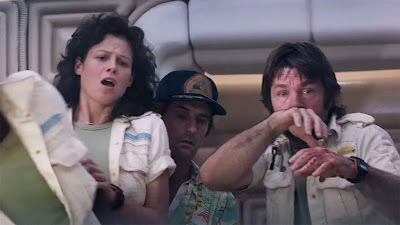Scary Enough
 I'm a big fan of the horror genre, whether books, movies, or roleplaying games. As a kid growing up in the 1970s, horror and the occult were in the air, so it was difficult not be exposed to it. Consequently, when I saw the first advertisements for Call of Cthulhu in 1981, I knew I had to get a copy. CoC quickly became one of my favorite games, joining Dungeons & Dragons and Traveller to form the Holy Trinity of RPGs from my youth. In the years since, I haven't played Call of Cthulhu as much as I've used to, but I still regard it very highly and hope one day to have the chance to play it again.
I'm a big fan of the horror genre, whether books, movies, or roleplaying games. As a kid growing up in the 1970s, horror and the occult were in the air, so it was difficult not be exposed to it. Consequently, when I saw the first advertisements for Call of Cthulhu in 1981, I knew I had to get a copy. CoC quickly became one of my favorite games, joining Dungeons & Dragons and Traveller to form the Holy Trinity of RPGs from my youth. In the years since, I haven't played Call of Cthulhu as much as I've used to, but I still regard it very highly and hope one day to have the chance to play it again.One of the interesting things about horror RPGs is that almost no one who plays them is ever really frightened. Someone might play his character as if he were frightened, but I don't think I've ever seen anything in a game genuinely scare a player, at least not deliberately. That never really bothered me, because, let's face it, it's not that easy to induce fear while sitting around a table in a well-lit room with a bunch of your friends. Plus, would it even be fun to play a game where you're routinely frightened in the way you might be watching a movie or reading a book?
Even so, there's always been part of me that, as a referee, has wondered about the question of why we play horror RPGs and what we hope to get out of them. That's why I was so taken with a section in the Warden's Operations Manual for the new edition of the sci-fi horror game Mothership that addresses this very issue:
Actually scaring your players, like they might get scared watching a horror film or playing a video game is an incredibly rare thing. It is not a measure of a successful game night. Most of the time, your players simply want to have fun in a horror setting. This means they want to play characters who feel afraid, while they the players sit back eating chips and rolling dice. Sometimes you have players who love to be scared and really get into it. If that's the case, enjoy it! But don't feel bad if it doesn't happen every week. Instead focus on keeping the tension escalating.
I think this is quite close to the truth of it, at least as I've experienced the play of horror RPGs over the years. The horror present in your typical Call of Cthulhu scenario, for example, is largely intellectual rather than emotional. Very few players will ever feel frightened or disgusted by events in the game, even if they understand that their characters, being ordinary people, would probably feel those things within the context of the game world. This makes for a better roleplaying experience in at least two respects. First, it doesn't set the bar so high for the referee that he'll never achieve "success." Second, it helps maintain a little distance between the players and the often horrific things with which their characters must deal.
That said, even highly intellectualized fear, horror, and revulsion are all useful tools for the referee in presenting an engaging setting and/or scenario. After all, fantasy can be frightening and confronting frightening things in a fictional context can be very appealing to a lot of people, especially those among us who are normally not very brave. In that respect, it's not much different than the more general experience of fictional danger found in many common RPG activities, like combat or exploration. It's fun for our characters to do or to endure things that we'd never be able to or indeed want to, isn't it?
James Maliszewski's Blog
- James Maliszewski's profile
- 3 followers



